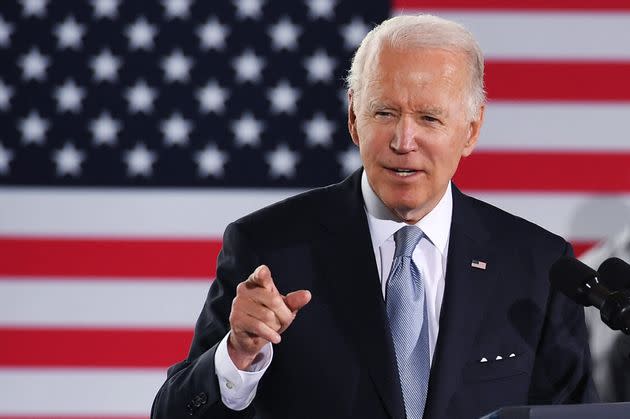President Joe Biden Makes His First Midterm Endorsement

President Joe Biden name-checked Rep. Kurt Schrader (D-Ore.) at an infrastructure event in Portland, Oregon, on April 21. He later endorsed Schrader for re-election. (Photo: MANDEL NGAN/Getty Images)
President Joe Biden made his first endorsement of the midterm election cycle on Saturday, lending his support to Rep. Kurt Schrader (Ore.), a centrist Democrat locked in a contentious primary.
“We don’t always agree, but when it has mattered most, Kurt has been there for me,” Biden said in a statement. “And in doing so, he has helped to pass much of my agenda into law ― making a huge difference in the lives of the Oregonians he represents and all of America.”
“Now we have a lot more to do and to get it done we need to keep a Democratic Congress,” he added. “Kurt Schrader has had my back from early on and played an important part in the progress we have made as a nation.”
Biden visited Portland, Oregon, last Thursday to celebrate the administration’s infrastructure investments. All of Oregon’s Democratic members of Congress, including Schrader, were present. Biden name-checked Schrader, saying he’d “played a key part in the progress we’ve made as a nation on jobs, economic growth and clean energy.”
Schrader, one of Congress’ most conservative Democrats, faces a challenge from progressive attorney Jamie McLeod-Skinner in the May 17 primary for Oregon’s 5th Congressional District.
McLeod-Skinner, who has tried to present herself to voters as a better ally for Biden than Schrader has been, expressed polite disagreement with Biden’s decision and suggested it was evidence of Schrader’s desperation.
“The fact that Schrader is calling in political favors from national Democrats shows he knows our campaign of working people in Oregon is stronger than ever,” she said in a statement.
Oregon’s 5th remains a Democratic-leaning seat, but redistricting has made it slightly less of a sure bet for the party. Biden won the old district, centered more in Portland’s suburbs and exurbs, by about 10 percentage points, but he would have won the new seat, which includes large swaths of rural central and Eastern Oregon, by about 9 points.

Jamie McLeod-Skinner, left, is challenging Rep. Kurt Schrader (D-Ore.), right, on the grounds that he is not a good ally to President Joe Biden. (Photo: Associated Press/Getty)
As a result, House Democrats’ official campaign arm, the Democratic Congressional Campaign Committee, has taken an active role in Schrader’s primary race, maintaining that a different Democratic nominee would be more vulnerable in a possible Republican wave year.
But progressives backing McLeod-Skinner were disappointed in Biden’s announcement, arguing that it rewards one of the Democratic Party’s least cooperative members and will discourage progressive base voters from showing up in November.
“Midterms are about enthusiasm. The party out of power has it, and the party in power doesn’t,” tweeted the Working Families Party, which is backing McLeod-Skinner. “Democrats can reverse that trend, but to do it they need to embrace working-class candidates like [McLeod-Skinner], not corporate incumbents who undermine their popular agenda.”
Leah Greenberg, a co-founder of the progressive group Indivisible, which is also backing McLeod-Skinner, pitched McLeod-Skinner as a truer fighter for Biden’s agenda.
“If you want someone who will actually deliver on the Democratic agenda, there’s only one choice,” Greenberg tweeted.
Schrader has indeed broken with Biden to a degree that’s rare for a Democrat who hails from a district Biden carried. Schrader voted against the COVID-19 relief bill that passed the House in February 2021, before approving the version sent back by the Senate. He joined other moderate Democrats in helping decouple the ambitious Build Back Better legislation from the bipartisan infrastructure bill, which many observers believe undermined the former’s chances of passing. And taking advantage of Democrats’ narrow margins in the House, Schrader insisted on watering down Biden’s prescription drug negotiation bill as a condition for his support.
In response to Schrader’s actions, McLeod-Skinner has attracted an unusual level of support for a primary challenger from organized labor and local Democrats, including four county Democratic parties.
Nonetheless, Schrader is the front-runner ― not least due to his major campaign cash advantage. Thanks in part to his status as a darling of the pharmaceutical industry, Schrader has spent nearly $2 million defending his seat, and benefited from the independent support of a Big Pharma-backed super PAC.
Schrader has used his ample funding to paint himself as a champion of lower prescription drug prices ― a move that one advocate for affordable drugs called “the height of hypocrisy.”
This article originally appeared on HuffPost and has been updated.


